Mark Anthony Neal's Blog, page 1018
March 8, 2012
Olympic Gold Medalist Cullen Jones Launches 2012 Make A Splash Tour
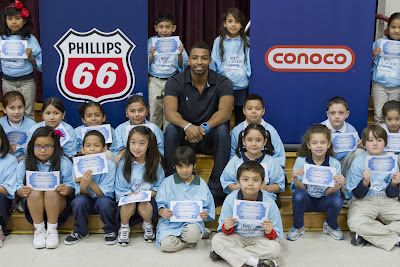
For ImmediateRelease
ConocoPhillipsand USA Swimming Foundation Bring Olympic Gold Medalist Cullen Jones to Houstonto Kick Off Water Safety Tour, Educate Kids About Learning to Swim
HOUSTON, Feb. 29, 2012 -- Justin time for spring break, ConocoPhillipsand the USA Swimming Foundation will bringOlympic Gold Medalist swimmer, Cullen Jones, to Houston to raise awareness about the importance oflearning to swim. The event, scheduled for March 7,marks the kickoff of the 2012 Make a Splash Tour with CullenJones presented by ConocoPhillips, a six-city national water safety tourdesigned to educate parents, kids and communities about the importance oflearning to swim.
"Everychild in America needs to learn how to swim. It is a critical skill that candetermine the difference between life and death in a matter of seconds,"said Jones, the first African-American male to hold a world record in swimming."Drowning is an epidemic, but it's an epidemic with a cure. That is why Iam so proud to be working with ConocoPhillips and the USASwimming Foundation to educate parents, children and caregivers about thelearn-to-swim resources available in their communities. By raising awarenessand providing the opportunity for more kids to learn to swim, we are saving lives."
Olympian Comes to TownInHouston, Jones will lead a youth rally withapproximately 320 children at Buffalo Creek Elementary School. He will sharehis personal story about nearly drowning when he was five and discuss theimpact the sport has had on his life, including his Olympic journey.Additionally, all first and second graders of Buffalo Creek Elementary willreceive a full session of free swimming lessons at Clay Road Family YMCA,courtesy of the USA Swimming Foundation andConocoPhillips. The Houston tour stop will alsoinclude a semi-private swim lesson for several local kids at Clay Road FamilyYMCA.
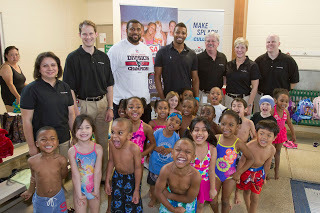 w/ Duane Brown of the Houston Texans "TheUSA Swimming Foundation is dedicated to savinglives and building champions, and by raising awareness about the importance oflearning to swim and providing the opportunity for kids to take lessons, we areabsolutely saving lives," said Debbie Hesse,executive director of the USA SwimmingFoundation. "To date, more than 1.1 million kids have taken lessonsthrough our Make a Splash initiative, and we've reached millions of parentswith the message of learn-to-swim. We are grateful to ConocoPhillips, who hasmade such a difference nationally and in Houstonspecifically, and to Cullen Jones for his passionin spreading this important message."
w/ Duane Brown of the Houston Texans "TheUSA Swimming Foundation is dedicated to savinglives and building champions, and by raising awareness about the importance oflearning to swim and providing the opportunity for kids to take lessons, we areabsolutely saving lives," said Debbie Hesse,executive director of the USA SwimmingFoundation. "To date, more than 1.1 million kids have taken lessonsthrough our Make a Splash initiative, and we've reached millions of parentswith the message of learn-to-swim. We are grateful to ConocoPhillips, who hasmade such a difference nationally and in Houstonspecifically, and to Cullen Jones for his passionin spreading this important message."ConocoPhillipshas partnered with USA Swimming for 39 years,and the Make a Splash Tour is a natural extension of the company'scomprehensive commitment to safety. "Our annual support of the Make aSplash Tour embodies the company's focus on safety by reaching out to parentsacross the nation to build awareness of this important safety issue, and bygiving thousands of children the opportunity to learn a valuable life-savingskill," said Kristi DesJarlais, manager,Corporate Brand and Community Investment, ConocoPhillips.
Sobering Drowning StatisticsApproximately10 people drown every day in the U.S., according to the Centers for DiseaseControl and Prevention (CDC), and more than one in five fatal drowning victimsare children younger than 14. Drowning is also a silent killer—most youngchildren who drowned in pools were last seen in the home, had been out of sightless than five minutes, and were in the care of one or both parents at thetime, according to the Present P. Child Drowning study.
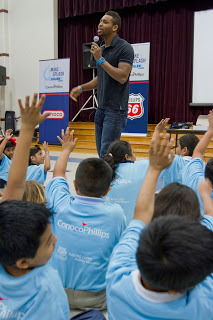 Furthermore,60-70 percent of African-American and Hispanic children cannot swim, and only13 percent of kids who come from a non-swimming household will ever learn toswim, according to a national research study by the USASwimming Foundation and the University of Memphis.African-American children drown at a rate nearly three times higher than theirCaucasian peers, the CDC reports.
Furthermore,60-70 percent of African-American and Hispanic children cannot swim, and only13 percent of kids who come from a non-swimming household will ever learn toswim, according to a national research study by the USASwimming Foundation and the University of Memphis.African-American children drown at a rate nearly three times higher than theirCaucasian peers, the CDC reports. In2012, Jones will visit a total of six cities to promote the availability offree or discounted swimming lessons or water safety education, providing kidsaccess to life-saving swimming skills, regardless of their ethnic or economicbackground.
About the USA Swimming FoundationTheUSA Swimming Foundation serves as thephilanthropic arm of USA Swimming. Established in 2004, the Foundation works to strengthen the sport by savinglives and building champions— in the pool and in life. Whether we're equippingour children with the life-saving skill of learn-to-swim, or providingfinancial support to our heroes on the U.S. National Team, the USA Swimming Foundation aims to provide the wonderfulexperience of swimming to kids at all levels across the country. The Foundationalso serves as the home for our National and Olympic Team Alumni reunions andregional events. The development efforts of the USASwimming Foundation aim to establish an endowment to strengthen the future of USA Swimming's programs and services. To learn more,visit www.usaswimmingfoundation.org.
About ConocoPhillipsConocoPhillipsis an integrated energy company with interests around the world. Headquarteredin Houston, the company had approximately 29,800employees, $153 billion of assets, and $245 billion of revenues as of Dec.31, 2011. For more information, go to www.conocophillips.com.
Since1973, the company's contributions have supported the USASwimming community through the National Championships and other internationalcompetitions, publication of club development materials, and other areas.
About Make a SplashMakea Splash is the national child-focused water safety initiative of the USA Swimming Foundation. Through its 487 local partnerprograms, Make a Splash offers free or discounted swimming lessons or watersafety education in 47 states. To find a local partner, visit www.makeasplash.org.
About CullenJonesCullen Jones is one of the fastest freestyle sprinters inthe world today and currently holds the American record in the 50 freestyle. Atthe 2008 Olympic Games in Beijing, he was amember of the electrifying 400m freestyle relay team that broke the worldrecord and won Olympic gold in one of the most memorable races in history. Withthe victory, Cullen became the second African-American to win an Olympicswimming gold medal. He is currently training for the 2012 Olympic Games andtrains under coach David Marsh at SwimMAC in Charlotte, N.C.
# # #
Press Contacts:Charlie Guadano |Simone Smalls PR, Inc.917.388.3890 | Charlie@simonesmallspr.com
Simone Smalls |Simone Smalls PR, Inc.917.388.3890 | Simone@simonesmallspr.com
Published on March 08, 2012 17:12
March 7, 2012
KONY 2012 | Invisible Children
KONY 2012 is a film and campaign by Invisible Children that aims to make Joseph Kony famous, not to celebrate him, but to raise support for his arrest and set a precedent for international justice.
Published on March 07, 2012 17:53
UTBlackademics ... Moving to More Broadly Share the Work of Black Studies Faculty
UTBlackademics is an effort to use social and new media to share the work of Black Studies Faculty at The University of Texas at Austin.
Published on March 07, 2012 17:42
Bigger Than Rush: The Violence of Language and Language of Violence
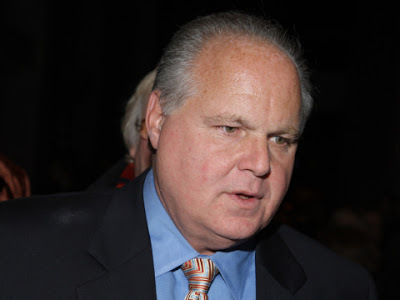
Bigger Than Rush: The Violence ofLanguage and Language of ViolencebyDavid J. Leonard | NewBlackMan
RushLimbaugh has once again demonstrated the entrenched misogyny of Americanculture. Calling Sandra Fluke a "slut"and a "prostitute," among other things, is telling of both his own ideologicalfoundation as well as society's. Unfortunately,the conversation and public outrage has often drifted away from the broaderissues of violence, sexism, and misogyny, away from the broader attack on girlsand women, instead focusing on "politics," on removing Rush from the airwaves,on sponsors, and myriad other issues. Increasingly, as Rush's defenders cite double standards, whether in theform of societal acceptance of sexism within hip-hop or from liberalcommentators, the debate is moving away from the issues of violence. In focusing on only Rush (he is reprehensible),the politics, and in debating claims about hypocrisy, we are failing to seeRush and his comments as a symptom thereby obscuring the consequences of this language andits place within the broader war against young girls and women.
RushLimbaugh once again illustrated the reasons we need to "occupy" theairwaves. As Iwrote last month about Fox News and the soiling of already violent publicdiscourse, the ubiquity of racism, sexism, homophobia, and xenophobia withinthe public square represents a major threat:
Racism, homophobia, immigrant bashing, misogyny and a general tone ofviolent rhetoric is almost commonplace at Fox. Their motto of "Fair andBalance" seems apt at this point where they are fairly balance with comments ofracism, sexism, homophobia, and xenophobia. The saturation has producedan almost normalizing effect whereupon progressives and society at large don'teven notice at this point, simply dismissing as Fox being Fox. Yet, theconsequence, the pollution of the public discourse, the assault on theepistemology of truth, and an overall souring of the public airwaves with dailymorsels of disgusting, vile, and reprehensible rhetoric, illustrates that "Foxbeing Fox" poses a serious threat to Democracy, not too mention justice andequality.
Limbaugh'srecent comments are yet another example of "Rush being Rush" and the level ofviolence that "occupies" America's airwaves. The demonization of women, the criminalization ofblacks and Latinos, and the overall climate of racial/gender pathologizing areas commonplace as the scapegoating of hip-hop within today's media. This is evident in the language ofeveryday life. Violent rhetoric has consequencesevident in ubiquity of sexual violence, racial profiling, and job and housingdiscrimination. They matter notonly because the words themselves are violent, but also because they provide awindow into a larger structural reality; words matter because they hurt andbecause the sources of meaning, the history embedded in our language, and our senseof imagination all emanate from this place.
Ina recent Daily Beast column, Kirsten Powers,citing examples of misogyny from the likes of Bill Maher, Keith Olbermann andChris Matthews, among others (not surprisingly as a Fox contributor she doesn'tcite any examples from her employer despite the following examples), argues that, "It'stime for some equal-opportunity accountability. Without it, the fight againstmedia misogyny will continue to be perceived as a proxy war for the DemocraticParty, not a fight for fair treatment of women in the public square." Whilenot buying the narrative that seeks to directly or indirectly excuse Rush'scomments by noting the sexism of the "left" as evidence of both a doublestandard and a selective denunciation of sexism from the right (seehere for example and hereand here and here and here and here), any effort totransform public discourse must account for all forms of violence and the waysthat racism, sexism, homophobia, and xenophobia pollute and define media culture. Rush's comments are not an isolatedincident (for him or talk radio) given his consistent demonization of MichelleObama (#1, #2). Yet, Rush's comments must also beunderstood in relationship to the disgusting comments from Michael Moore (amongothers), who responded to Limbaugh with the followingtweets:
I guess Romney knew that Rush, who made the mistakeof saying what most Republicans think (women as sluts), had cost him the Nov.election.
Or after losing 6 sponsors yesterday Rush decided heloved $ more than he loved calling women prostitutes. Musta been a tough call,eh Rush?
Some sponsors don't care how much Limbaughapologizes: mmflint.me/Awf562 (I know – what were they doing there in the 1stplace?)
RT @pattonoswalt Ayn Rand would be very pleased withhow the free market bitch-slapped Limbaugh today.
Dear Rush: Please don't stop! You say what the Rcandidates don't. Voters must hear every day til Nov what Republicans trulythink of women.
Don't give up, Rush! It' s a WAR ON WOMEN & you'rethe Supreme Leader. Keep reminding voters how hate & violence drives theRepublican agenda
Rush – As soon as u started losing the big $$ fromyour hate speech, you caved & obeyed the men who pay u. Who's theprostitute now, bitch?
And BTW Rush, your vile & vicious attacks on meover the years – I wear them as a badge of honor. You are sad & sick &I've always pitied u.
Theuse of "bitch," "bitch-slapped" and prostitute here, just as the sexualizationof women from the likes of Bill Maher, is not a cover for the likes ofLimbaugh. Sure, the ideologicalunderpinnings and the larger visions of society are different, but that doesn'tsanction the language nor does it limit the consequences. Limbaugh's comment read inside of alarger context points to the necessity of not simply removing Rush Limbaughfrom the airwaves but transforming a society that needs and props up the Rushesin our mix.
Hisrecent comments also point to the importance of language and transforming thatlanguage throughout society. H.Sammy Alim brilliantly articulated the power of language and the necessityof transforming our collective consciousness: "What kinds of issues wouldOccupy Language address? What would taking language back from itsself-appointed "masters" look like? We might start by looking at thesequestions from the perspective of race and discrimination, and answer with howto foster fairness and equality in that realm," he wrote in The New York Times. The protest against Rush Limbaugh mustbe a reminder of the power of language and the importance in occupying bothlanguage and airwaves. It "teachesus that we give words meaning and that discourses are not immutable, and from the way indigenous movementshave contested its use, which teaches us to be ever-mindful about how languageboth empowers and oppresses, unifies and isolates. . . .Pejorative,discriminatory language can have real life consequences." The language of Rush Limbaugh and thelanguage of Michael Moore, among others, have consequences evident in thesexualization faced by women, the sexual violence endured by girls and women,and the systemic discrimination experienced by women throughout society.
Moreover,the relative silence regarding the persistent demonization of women of color,on and off the airwaves, illustrates how these consequences extend beyond individualinstances. What does it tell usthat Sandra Fluke has elicited rightful outrage but the daily assault faced bywomen of color elicits limited outrage from society at large?. Change will not come simply by denouncing,exposing, and demanding accountability from those who give voice to largersystems of violence. It is time tooccupy the language and transform the airwaves. As Dr.Mark Anthony Neal notes, "We need some new strategies—this protest,petition, and wait for the apology, suspension, removal is getting old." Rush'sabandonment by his sponsors, and his potential removal from the airwaves willnot transform our language nor will it lead to the eradication of sexism unlesswe begin to transform the language, the airwaves, and the institutions that arethe oxygen that sustains Rush Limbaugh and a larger culture that he represents.
***
David J. Leonard is Associate Professor in the Department of CriticalCulture, Gender and Race Studies at Washington State University, Pullman. Hehas written on sport, video games, film, and social movements, appearing inboth popular and academic mediums. His work explores the political economy ofpopular culture, examining the interplay between racism, state violence, andpopular representations through contextual, textual, and subtextual analysis. Leonard's latest book After Artest: Race and the Assault on Blackness will bepublished by SUNY Press in May of 2012.
Published on March 07, 2012 10:53
March 6, 2012
Liberating 'Black Radio': The Robert Glasper Experiment
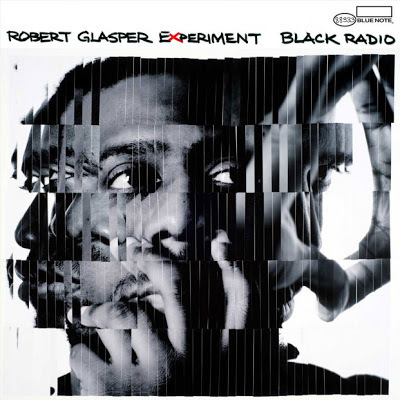
Liberating 'Black Radio': The Robert Glasper Experiment by Mark Anthony Neal | NewBlackMan
Asa medium, Black Radio was historically critical to the Black freedomstruggle. The infusion of Blackthought and musical expression onto the radio airwaves, particularly afterMemphis's WDIA, broke the color barrier and began programming Black music 24-7.In this sense Black Radio literally helped shape decades of American cultureand politics, whether it was Robert Williams, in exile, programming his "Radio Free Dixie" show from Havana, Cuba in the early1960s, young White kids consuming Ruth Brown, Big Mama Thornton, or LittleWillie John as if it was contraband, or Black owned radio stations opening upits studios to the Civil Rights movement. In its most classic forms, Black Radio, was charged with expanding theminds and listening taste of its core audiences, recalling WBLS' well knownadage (circa 1972) that it was "The Total Black Experience in Sound."
Onewould be hard-pressed to think of contemporary Black radio in such a context,even with an entity like Radio One and personalities like Michael Baisden andTom Joyner achieving unprecedented national visibility. Nearly two decades ago, The FamilyStand more aptly described Black radio as "plantation radio" or "Knee-grow"radio as Soul-Patrol co-founder Bob Davis often describes mainstream Blackmedia. Indeed Public Enemy even gave instructions on "How to Kill a RadioConsultant." Thus it is hard not to think of pianist Robert Glasper'scompelling new recording Black Radio (with the Robert Glasper Experiment) as anything other than a majorintervention.
Growingup in New York City, I was fortunate to be exposed to legendary radio jockssuch as HalJackson, Vaughn Harper, Vy Higginson, Jerry Bledsoe, ChuckLeonard, Lamar Renee and Frankie Crocker. Ididn't just tune in to listen to music, but the radio—Black radio—served as alearning lab; Their playlists served as the very foundation for, not only mylove of music, but my vocation as a scholar and critic of Black music. I imagine that Robert Glasper mighthave similar memories of Black radio.
Thegenius of Glasper's new recording is its willingness to expand the range ofwhat we consider Black music and what Black radio might consider as appropriatefor Black or so-called "Urban" audiences. Thus Glasper's decision to cover tracks as wide-ranging as Nirvana's"Smells Like Teen Spirit" (with auto-tune in tow), Mongo Santamaria's "Afro Blue" (with lyrics from OscarBrown, Jr.), Sade's "Cherish the Day" and John Coltrane's "A Love Supreme," isnot as far-fetched as it seems; These are the sounds of a CosmopolitanBlackness, that Black radio, and Black artists, particularly given theirtravels, have historically been on the cutting edge of. Equally cosmopolitan isGlasper's collection of collaborators.
Thoughmost well known as a jazz pianist, Glasper has long frayed the edges of thepristine space that "serious" Jazz currently inhabits in the Americanimagination. Like his invocationof Black Radio, the project is areminder Jazz was once a popular form within Black communities—listened to alongsideMotown, Doo-Wop, and southern Soul in ways that rarely raised an eyebrow. Glasper is part of a nearly twogeneration effort—think about the work Greg Osby, Steve Coleman, the late Keith"Guru" Elam and Branford Marsalis (Buckshot LeFonque)—to re-introduce Jazz as avital popular sound, and not as a museum art that is neither accessible oraffordable to the very communities responsible for its creation (not naming nonames…Wynton).
Likehis older Texas peer trumpeter Roy Hargrove, Glasper likely had little choicebut to hear the burgeoning rhythms of Hip-hop, and has sought to cultivatecreative spaces that acknowledge such influence. Glasper have done so on all of his major label releases,including 2009's Double-Booked, whichwas premised on the idea that Glasper's trio was booked to perform at a clubwith Terence Blanchard, at the same time that Ahmir "?uestlove" Thompson wantedthe Robert Glasper Experiment to jam with The Roots. Black Radio is the first Glasperrecording that grounds his music in an expansive context of contemporaryR&B and Hip-hop, as opposed to bringing those genres into a moretraditional jazz context
ErykahBadu, sounds perfectly at home singing "Afro-Blue," much the way Dianne Reeveswas when she recordedit twenty years ago, and Abbey Lincoln was more than fifty years ago when she recorded those originalOscar Brown, Jr. lyrics. The stillunderrated and vastly overlooked Stokely Williams, long-time lead of MintCondition, shines on the trippy "Why Do We Try." The inclusion of Williams also highlight's Glasper's desireto work with artists, generally in high regard for their artistry—like Lalah Hathaway and Meshell Ndegeocello—but who are often not afforded thesame level of visibility as some of their more traditional R&B peers. To this point, both Hathaway andNdegeocello released exceptional recordings last year, Where It All Begins and Weatherrespectively, that were largely ignored by so-called Black Radio.
Glasper'slongtime collaborator Bilal Oliver, shows up on two tracks "Letter to Hermione"and the affecting "Always Shine," which also features Lupe Fiasco. As Glasper recently told the New YorkTimes, he takes great pride in the fact that he was in the studio when the lateJames Yancey—J-Dilla—created the track "Reminisce" from Oliver's stellar debut First BornSecond .
Thetitle track, featuring Yasiin Bey (the rebranded Mos Def) speaks volumes aboutGlasper's intents to pursue what some might call, "post-genre" Black music; aterm that would strike older listeners as an oxymoron. Indeed scholar and musician GuthrieRamsey, whose own release The Colored Waiting Room shares Glasper's "post-genre" sensibilities, perhaps sums up the project best, writingthat Black Radio "plays with sonic,social, and iconic symbols in a way that recalibrates calcified, boring ideasabout genre and turns them on their head, all with a good sense of funkyadventure."
***
Mark Anthony Neal is the author of five books including theforthcoming Looking for Leroy:(Il)Legible Black Masculinities (New York University Press) and Professorof African & African-American Studies at Duke University. He is founder andmanaging editor of NewBlackMan andhost of the weekly webcast Left of Black . Follow him onTwitter @NewBlackMan.[image error]
Published on March 06, 2012 17:07
March 5, 2012
Left of Black S2:E22 | Black Women's Hair Matters and Black Queer Erotics in Cuba
Left of Black S2:E22 | March 5, 2012
Black Women's Hair Matters and Black QueerErotics in Cuba
Host and Duke University ProfessorMark Anthony Neal is joined in-studio by actress and playwright Chaunesti Webb ,creator and director of the new play ILove My Hair When It's Good: & Then Again When It Looks Defiant andImpressive . Neal andWebb discuss the relationship that Black women have with their hair and thebroader cultural meanings associated with Black women's hair. Webb also talks about her play, whichopens at the Manbites Dog Theaterin Durham, North Carolina on March 8th.
Later, Neal is also joined in-studioby Yale University anthropologist Jafari Sinclaire Allen. Neal talks with Allen about his newbook ¡Venceremos?:The Erotics of Black Self-making in Cuba (Duke UniversityPress). Neal and Allen alsodiscuss the political and cultural significance of Cuba to Blacks in the UnitedStates and the power of the Erotic, per the work of the late Audre Lorde.
***
Left of Black is a weekly Webcast hosted by Mark Anthony Neal and produced incollaboration with the John Hope Franklin Center at Duke University.
***
Episodes of Left of Blackare also available for free download in HD @ iTunes U
Published on March 05, 2012 15:41
Thinking While Black: Jada Williams Connects 'A Narrative of the Life of Frederick Douglass' to Contemporary Education
from the Frederick Douglass Foundation of New York
Jada Reads her Essay. Find out what happened to her after writing this essay that was supposed to be entered into a contest (which never was) Find out more about what happens when you stand up to fight for your education. Let's hold the Rochester City School District accountable.
Here are some details:
Pt. 1 - http://www.fdfny.org/blog/2012/02/17/they-kicked-her-off-the-plantation/
Pt. 2 - http://www.fdfny.org/blog/2012/02/18/a-follow-up-on-the-persecuted-miss-willi...
Pt. 3 -
http://www.fdfny.org/blog/2012/02/20/they-kicked-her-off-the-plantation-part-...[image error]
Published on March 05, 2012 07:23
Like Father, Like Son?: An Open Letter to Coach Pat Knight
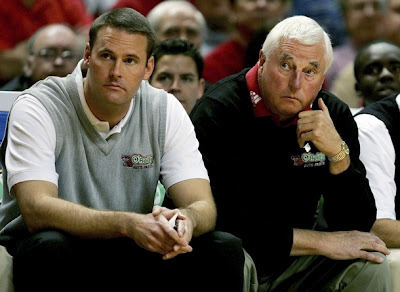
Like Father,Like Son?: An Open Letter to Coach Pat Knight byDavid J. Leonard | NewBlackMan
DearCoach Pat Knight (Lamar University):
Iam writing to you about your post-game comments the other night. As others may not have seen your pressconference, I quote it for their sake. Entering the press conference, you firsttell a student-athlete: "I am next, because you don't have a clue what it takesto win." Your tone of disrespect didn't end there:
We'vegot the worst group of seniors right now that I've ever been associated with.Their mentality is awful. Their attitude is awful. It has been their M.O. forthe last three years.
We'vehad problems with them off the court, on the court, classroom, drugs, beinglate for stuff. All that stuff correlates together if you're going to wingames. You just can't do all that B.S. and expect to be a good team and wingames. These guys got to learn; they have to grow up. They don't need to becoddled; they don't need to be babysat. That is the problem with society . . . because people don't make kidsaccountable. These kids arestealing money by being on scholarship with their approach . . . . If you actlike this in the real world, you are going to be homeless, with a job… And ifpeople have a problem with me being harsh about it, I don't care. I came hereto clean something up.
Whileothers have called your post-game comments an "epicrant," as "toughlove" or as an example your honesty, I don't share their opinion. It was abusive, disrespectful and anaffront to the educational mission of every institution of higherlearning. You have defended thesecomments by noting the support of your fellow coaches, who are "all dealingwith the same thing." You have cited parents as so appreciative of yourcomments that they would want their kids to play on your team. While I don't write as a parent(although the thought of my kids learning anything from you is one I cannotbear), I do write you as a teacher and a member the higher education community.
Iam not sure if you think of yourself as a teacher or an educator. I don't know if you subscribe to thebelief that coaches, like professors, are advancing the mission of highereducation through instilling values, fostering skill development, and otherwisepreparing the next generation to succeed in all walks of life. SallyJenkins, a sports columnist with the WashingtonPost, highlights the presumed pedagogical power (or mission) of collegiatecoaches:
Thebest college coaches teach sport as a set of problems and how to tease out the solutions.They don't just teach content and skill, but how to transfer it into real-worldperformance through study, organization and communication under pressure. Theyask, what happens if you follow a strategy to its logical conclusion? What arethe consequences of making things up as you go along? Why do things break down?What are effective fallback principles when skill or strategy breaks down? Whatare the traits of successful organizations across professional boundaries?
Iwould gather that you do see yourself as an educator, as a teacher molding thefuture generation. Whether true ornot, I have to tell you your approach is both troubling and offensive and hasNOTHING to do with teaching or educating. Teaching is not about publicly humiliating; teaching is not aboutridiculing, demeaning, and disrespecting. You may think your approach reflects a commitment to disciplinarity andaccountability but there have to be other ways to instill a commitment to excellenceon and off the court. Anyone canstand before an audience, microphone in hand, without fear of any reprisal, tocriticize. Teachers find otherways of inspiring, informing, or helping beyond intimidation and fear. Teachers don't violate the trust oftheir students by announcing their grades in front of millions of people. Teachers don't disrespect theirstudents; calling out behavior is one thing, but condemning their character isanother. Your decision to treatstudent-athletes as children, to publicly condemn and ridicule them, shows thatyou have a lot to learn as a teacher because anyone has the capacity to do whatyou did that night.
Beyondthe tone, do you think it is proper to share students' private academicrecords? You obviously do becauseyou followed your press conference withadditional statements about academic performance: "I've never seen more F's on report cards than I ever havesince I got here. Missing classes, being late for workouts, missing workouts. …What I don't think they understand is all that correlates together. If you'renot going to be a winner off the court, you're not going to be a winner on thecourt." What good can come from embarrassing these students? At the same time,do you think it is proper to reference drug arrests, even though when Isearched online all I could find is one arrest for a minor marijuana possessioncharge?
Iwould be remised if I didn't bring up the racial optics of a white male coachpublicly chastising, ridiculing and demonizing 5 African American players (basedon search of roster, it appears that all 5 seniors are black)? Did you think about how publiclycastigating 5 black players as academically deficient, drug using, andotherwise lacking the requisite values and attitude to be successful asbasketball players or people fits in a larger racial context? Did you think about the societalstereotypes and how your claims are not only disrespectful to the players butreinforce widely circulated stereotypes about student-athletes and particularlyblack student-athletes?
Yourarrogant comments makes me wonder if you and Newt Gingrich are writing a booktogether acting as if success and opportunity come as the result of a recipe ofvalues, work ethic, and the right cultural ethos. Was he busy lecturing members of the NAACP so you decided touse your platform to reduce success and failure to attitude and values? Do you really think that excoriating 5(black) players will help them develop a work ethic to avoid being homeless asif homelessness or unemployment is the result of not having the requisitevalues? You seem to imply thatpeople succeed or fail because of their actions, which is far from the truth(just ask Mitt Romney). I wonderhow your white manhood fits into your own career and how your own connectionsallowed you to make it irrespective of your own actions. You claim to fear for the futures ofthose players who lack the needed maturation, but maybe they have a Dad who canhelp them out.
Watchinga well-paid college coach lecture a group of student-athletes, whose labor isexploited, about their values and their behavior is the ultimate hypocrisy. But of course, the pedagogy ofdemonization, of ridicule, discipline and punishment, is not unique toyou. While you may want to focuson the culture of today's youth, your behavior reflects the educational failureof a nation more committed to blaming than educating, more committed todisciplining than empowering, and more committed to incarcerating thaninvesting. Your words areminder of what's at stake, as noted by HenryGiroux:
Thecurrent assault on young people, public education and critical thinking isfirst and foremost an attack not only on the conditions that make criticaleducation and pedagogy possible, but also on what it might mean to raisequestions about the real problems facing public education today, which includethe lack of adequate financing, the instrumentalization and commodification ofknowledge, the increasing presence of the punishing state in the schools, thehijacking of public education by corporate interests, the substitution oftesting for substantive forms of teaching and learning and the increasing attemptsby right-wing extremists to turn education into job training or into anextended exercise in patriotic xenophobia and religious fundamentalism. As theright-wing juggernaut destroys the social state, workers protections, unionsand civil liberties, it is easy to forget that a much less visible attack isbeing waged on young people and especially on public schools and thepossibility of critical forms of teaching.
Yourpedagogy is yet another reminder of why this year I will boycott March Madnessbecause as Kahlil Gibranonce noted I "Learnt silence from the talkative, toleration from theintolerant, and kindness from the unkind; yet, I am ungrateful to theseteachers."
Wishingyou a quick exit from the tournament,
David
***
David J. Leonard is Associate Professor in the Department of Critical Culture, Genderand Race Studies at Washington State University, Pullman. He has written onsport, video games, film, and social movements, appearing in both popular andacademic mediums. His work explores the political economy of popular culture,examining the interplay between racism, state violence, and popularrepresentations through contextual, textual, and subtextual analysis. Leonard's latest book After Artest: Race and the Assault on Blackness will bepublished by SUNY Press in May of 2012.
Published on March 05, 2012 06:26
Mark Anthony Neal's Blog
- Mark Anthony Neal's profile
- 30 followers
Mark Anthony Neal isn't a Goodreads Author
(yet),
but they
do have a blog,
so here are some recent posts imported from
their feed.



